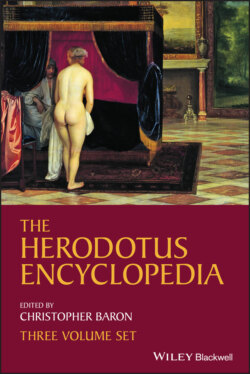Читать книгу The Herodotus Encyclopedia - Группа авторов - Страница 844
DELIAN LEAGUE/ATHENIAN EMPIRE
ОглавлениеAfter Pausanias’ recall, the Athenians assumed leadership of what became known as the DELIAN LEAGUE in 478/7. The purpose of the League was to seek VENGEANCE on Xerxes and to prevent Persian reprisals. Most members paid TRIBUTE, which was kept on the politically neutral island of DELOS, while other poleis contributed ships and rowers for naval campaigns (Thuc. 1.96).
The League quickly became a coercive instrument for making Aegean states subservient to the interests of Athens (Thuc. 1.99). Around 469/8, the Athenian general CIMON THE YOUNGER won a decisive victory over the Persians at Eurymedon off the southern coast of Anatolia. Though the need for an alliance no longer existed, the Athenians nevertheless started aggressively tightening their grip on their ALLIES, demanding ever‐higher tribute payments. They dealt mercilessly with poleis that revolted, and often Athens would confiscate part of their territory and found a CLERUCHY, or settlement for Athenian citizens (cf. Plut. Per. 11.5).
In 465, an EARTHQUAKE in the PELOPONNESE sparked a massive revolt of HELOTS at Mt. ITHOME. As Sparta’s PROXENOS, Cimon led 4,000 HOPLITES to aid SPARTA in putting down the REBELLION (Thuc. 1.101–2). While Cimon was away, his political rival Ephialtes (not the man by this name in Herodotus’ Histories) passed a series of measures designed to reduce the power of the ARISTOCRACY. The main target was the Areopagus, an aristocratic council composed of former archons, which according to some sources (e.g., [Arist.] Ath. pol. 23) was the most powerful institution in Athens. Ephialtes stripped the Areopagus of most of its powers except for trials involving homicide and certain religious offenses ([Arist.] Ath. pol. 23–25; Plut. Cim. 16–17). He also negotiated alliances with ARGOS, THESSALY, and MEGARA, all of whom were on bad terms with Sparta. Meanwhile, Cimon and his hoplites were humiliatingly dismissed by the Spartans, a move which diminished Cimon’s prestige at home and led to his ostracism (ten‐year EXILE).
With Cimon gone, Ephialtes and his faction were firmly in control, though the latter’s assassination in 461 paved the way for the rise of his associate PERICLES, the most influential politician of the fifth century (Thuc. 2.65.9). During Pericles’ ascendancy, Athens became the center of culture in the MEDITERRANEAN, attracting scholars, philosophers, artists, and writers from all over the Greek world. THUCYDIDES tells us that under Pericles, what was in name a democracy was in fact rule by the first citizen (2.65.9).
